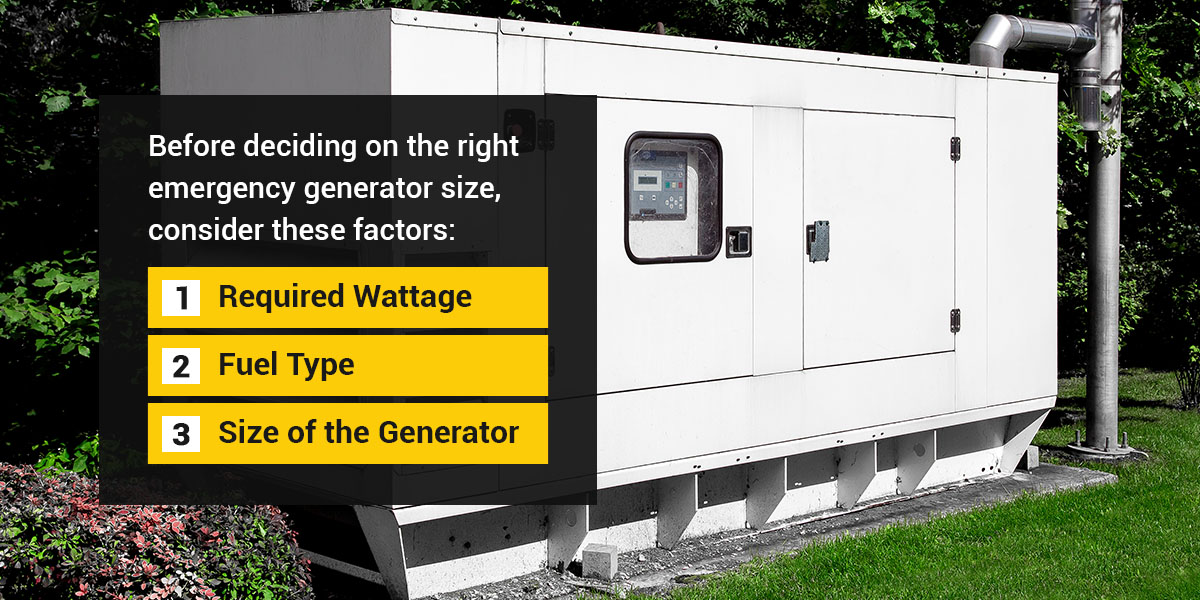
A sudden power outage can be detrimental to your company. Whether it’s a hurricane, planned maintenance, or equipment failure, losing power affects your customers, employees, and bottom line. Having a generator can keep your business running as usual. But how do you know which one you need? There are many types of generators out there that serve various purposes. Because your business is unique, you’ll need to consider a few key factors.
The first step is determining how much power you need to start and run your equipment. It’s important to consider your surrounding environment, fuel type, and size. Keep reading to determine what size generator you need for emergency power to ensure your operations can keep going.
The first thing to do is assess your power requirements. What size building will you need to power in the event of an outage? Where is your equipment going to be used? What amount of power will be required to support your applications?
Your site conditions will give you a good indication of the type of generator that suits your needs. Every commercial building has a different reason for using a generator, such as keeping machines running at an industrial plant during a severe storm. As a technician, you may need a commercial generator to keep your construction project going through the night, or you may require a solution for a remote job site. Consider whether a standby, primary, or emergency power system aligns with your demands.
To help simplify this decision, make a list of all the equipment your generator needs to power for any given reason. This includes machinery, lighting, security, telecommunications, and any other systems that are essential for safety and operations. Taking inventory will help you decide the type and size of generator you need.
Once you have a list of equipment that must be powered in case of an emergency, add up the wattage to get a rough estimate of your generator needs. You can start by calculating starting watts, or energy needed to power up equipment, and running watts, or energy needed to continuously power your equipment.
Most devices will have the wattage listed on the back or bottom of the unit. Keep in mind that devices with a range of power settings may consume more or less electricity. For instance, an industrial fan at low speed will use less electricity than when running at high speed.
If you cannot find the watts, use this equation to develop an estimate: WATTS = VOLTS x AMPS.
For example, if you have a piece of equipment at 10 amps that uses 240 volts, you would have a wattage of 2,400.
Another way to estimate the wattage required for your needs is using the following equation that applies to most commercial applications: 5 watts per sq. ft + 50 kilowatts.
This equation can help you give a general power requirement measurement to your dealer when searching for the correct size generator.

Before deciding on the right emergency generator size, there are several other factors to consider in your search.
Now that you have a rough idea of how to calculate the required wattage for your building and equipment, you’ll want to think about the different size generators that are available for most commercial applications. It’s important to choose a generator that meets your energy needs without wasting money or fuel on unnecessary wattage.
Here’s a brief comparison of various generators and their typical uses:
There are many types and sizes of generators that run on different fuel types, such as diesel, natural gas, gas, and propane. Each type of fuel has unique benefits and drawbacks. For instance, diesel generators may be more expensive upfront compared to gasoline generators. Each type of fuel varies in efficiency and how fast they burn, but it also depends on the amount of equipment you’ll need to power and the length of time.
When determining the size of the emergency generator you need, it’s essential to take storage into account. Choosing a generator that’s too big will cost you more money than necessary, and it can also be difficult to store if you’re low on space. This can also lead to inefficient power production and damage to your electrical systems.
Alternatively, a generator that’s too small may not adequately power your equipment and devices. This may cause your generator to overheat and lead to unreliable power in an emergency situation. The generator unit you choose should also be sufficient for your application and the length of time required for use.
The last thing you want to do is choose the wrong generator. In an emergency, your backup power source should be reliable and capable of powering your most essential equipment. If you’re unsure about the size or type of generator you need to keep everything running smoothly, it’s best to consult a professional to find one that suits your demands.
When you work with experienced professionals, you can protect your business that much faster. For example, you may find that a mobile generator set that can be installed quickly in an emergency situation is best for your company. Alternatively, a compression air solution or electrical distribution equipment may align better with your operations. Whatever you need, discuss your situation with a trusted dealer to ensure they have the exact size and specifications you require.
A generator for your company should be nothing short of reliable and efficient. At Thompson Power Systems, we carry a wide selection of power equipment manufactured by Caterpillar. These high-performing power systems will meet expectations in a variety of applications. Whether you have a short-term project or a sudden power outage, Cat® generators allow you to continue operations and prevent excessive downtime.
We’re your one-stop shop for equipment sales and rentals. We’ll work with you to find the right solution to keep productivity high in any situation. To learn more about our power systems, contact us today.